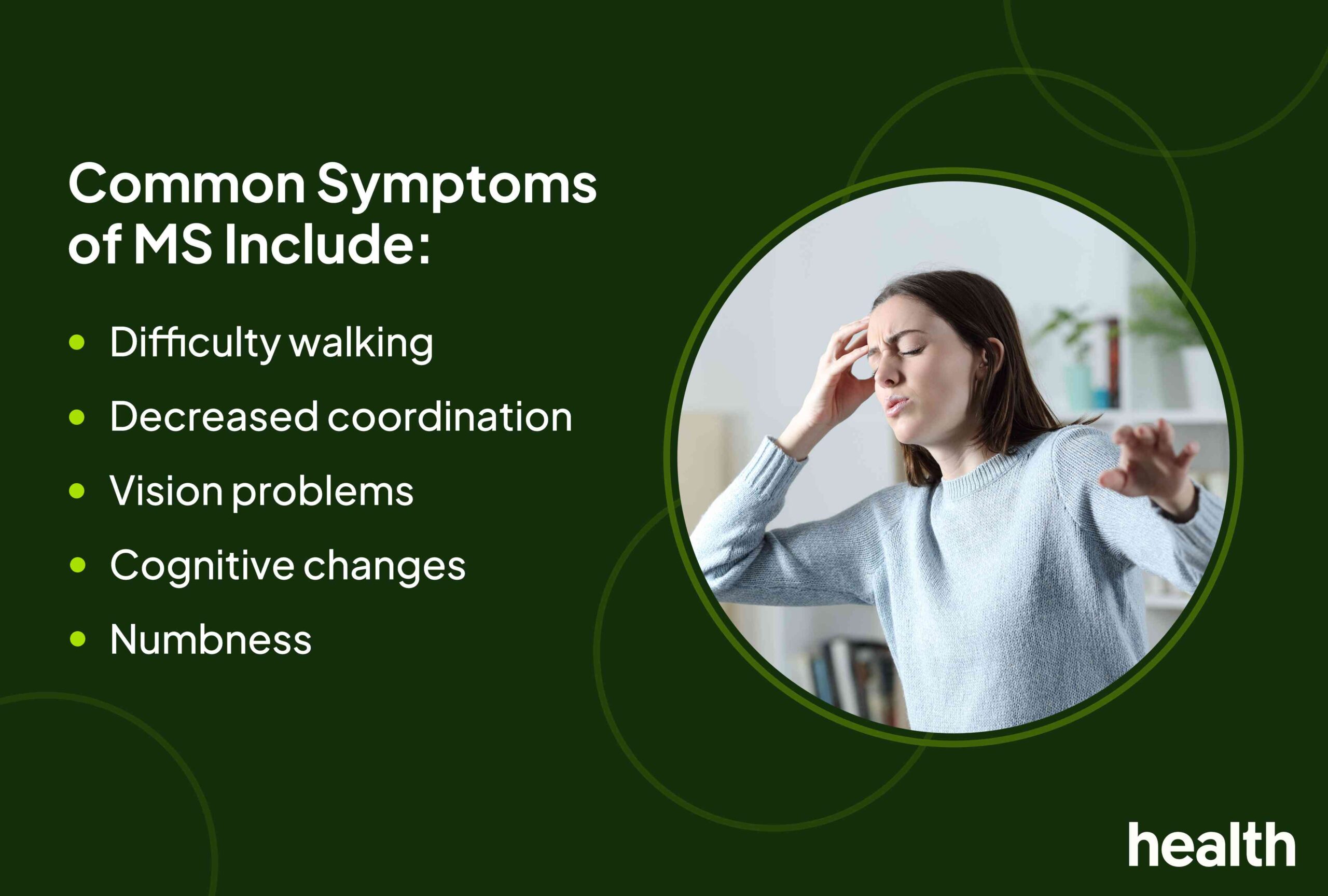:max_bytes(150000):strip_icc():format(jpeg)/Health-MS-horiz-8b08b59ad6fa4256a65df0f4497c9e6e.jpg)
Multiple sclerosis (MS) is an autoimmune disorder where the body’s immune system mistakenly attacks its nervous system, causing damage to the brain and spinal cord.
Symptoms usually appear between the ages of 20-40 years old. People typically experience sensory, motor, visual, and cognitive changes.
MS symptoms may progress differently in each person. Some people experience flares of symptoms with long periods of recovery in between (remission). The symptoms can be unpredictable, coming or going with little warning or changing over time. Other people will notice a steady worsening of symptoms.
Some people may be mildly affected by MS, and others may have more severe symptoms.
Design by Health / Getty Images
Multiple sclerosis can affect many aspects of how you move or how your body functions.
One of the more common symptoms of MS is a loss of controlled movement, known as ataxia. Up to 80% of people with MS experience this symptom. Ataxia can make walking difficult, decrease coordination, and make balancing harder.
Other changes due to ataxia include:
- Speech changes, such as scanning speech (pausing after each syllable in a word and saying each syllable slowly) or slurred speech
- Abnormal eye movements
- Challenges with performing everyday tasks that require steady hands (like buttoning a shirt or using a pen)
- Difficulty swallowing
A common first symptom of multiple sclerosis is facial twitching. Some people may experience muscle tremors or spasms, while others may feel stiffness in their bodies. In general, this can make movement more difficult. Other people may develop sudden, involuntary muscle contractions, which can cause repetitive movements or a pause in movement.
MS can also affect the function of your bladder and bowels. How they’re affected can change daily. For instance, it’s not uncommon to be constipated one day and then not be able to control your bowels the next. Some people will have a hard time emptying their bladder completely, while others may urinate more frequently. How urgently you need to urinate can change from day to day.
People with MS may also notice changes in their sex life. It may be harder to achieve an orgasm, and your libido (sex drive) may be lower.
A common first sign of multiple sclerosis is changes in your vision. The three most common visual changes are due to optic neuritis, diplopia (double vision), and nystagmus.
Optic neuritis is inflammation of the optic nerve that usually affects one eye. You can have an achy pain when you move your eye or lose or change your ability to see color. Your vision might also become blurred or dimmed. Most times, your vision will return to what it was.
Double vision occurs when the nerves that control eye movement are inflamed or damaged. The nerve damage can weaken muscles, making it hard for your eyes to coordinate. With double vision, you may see an object repeated either on top or next to each other. The effect may be temporary or long-lasting.
Nystagmus occurs when your eyes involuntarily make uncontrolled movements. The quick movements are usually up-and-down, side-to-side, or circular. Sometimes called dancing eyes, nystagmus can make it seem like things around you are moving. This symptom may be temporary or long-lasting.
Over half of people with multiple sclerosis experience cognitive changes, or changes in how their brain functions. These changes usually happen in the early stages of the disease. Memory and learning are the most commonly affected areas.
The changes are usually mild, though some people might experience changes that affect their ability to work. The changes that do occur usually affect one or two areas of cognition rather than all areas.
Some examples of cognitive changes include:
- Thinking more slowly
- Struggling to think of the right word
- Forgetting steps in tasks you perform every day
- Having a hard time making simple, everyday decisions
- Experiencing a decline in work performance
- Having a hard time keeping up with a conversation
Some people with multiple sclerosis develop new bodily sensations or changes to how the senses perceive their surroundings.
One of the most common sensory symptoms in MS is numbness. The loss of feeling is often experienced in an arm, a leg, or the face. You might also not be able to feel something when you touch it with your hand. For some, numbness might cause a pins-and-needles tingling sensation rather than a loss of feeling. The numbness can come and go.
Another common sensation in MS is Lhermitte’s sign. This is an electric shock feeling sent down the spine and to the extremities when you flex your neck. Lhermitte’s sign may also cause vertigo (feeling off balance).
Other people may have difficulty telling the difference between hot and cold temperatures. You may become more sensitive to heat, leading your body to overheat when exposed to hot temperatures. If you have Uhthoff phenomenon, overheating can lead to a temporary worsening of neurological MS symptoms.
It’s also possible to experience neuropathic pain (long-term nerve pain).
Some mental health conditions are more common among people with MS than the general population.
Depression and anxiety are the most common conditions that occur alongside multiple sclerosis. People with MS and depression may feel changes in their interests and mood. You may feel more tired. These symptoms may be worse at certain times of the day. Some people may also have feelings of guilt in regards to having the condition.
Up to 10% of people with multiple sclerosis develop symptoms before they turn 16 years old. Symptoms may be similar for adults and children—children may experience motor and sensory symptoms along with vision changes.
However, children typically have a more aggressive form of MS. For example, it is common for children to have significant cognitive impairment. Compared to adults, children with MS may have symptoms that affect their daily lives right away, and they may experience more flares.
If you think you may be experiencing any signs or symptoms of MS, consider seeing a healthcare provider. These symptoms include:
- Vision problems
- Muscle weakness
- Tingling, numbness, or pain in your body
- Clumsiness
- Issues controlling your bladder
- Dizziness
If you’ve already been diagnosed with MS, you’re likely already working with a healthcare provider to manage symptoms. On top of your regular medication management and symptom evaluation appointments, contact your provider if you experience any new or worsening symptoms.
Seek immediate care for any of the following:
- Suicidal thoughts
- Feelings of depression that last two weeks or longer
- Seizures
- Loss of vision
- Trouble breathing
- Suspected medication side effects
Multiple sclerosis is an autoimmune disorder that causes widespread, progressive symptoms. Symptoms vary from person to person and can change over time. You may notice movement, cognition, senses, and mood changes.
Common MS symptoms include vision problems, numbness or tingling, and loss of controlled movements. If you experience any signs or symptoms of MS, consider seeing a healthcare provider.
#Multiple #Sclerosis #Signs #Symptoms





















+ There are no comments
Add yours